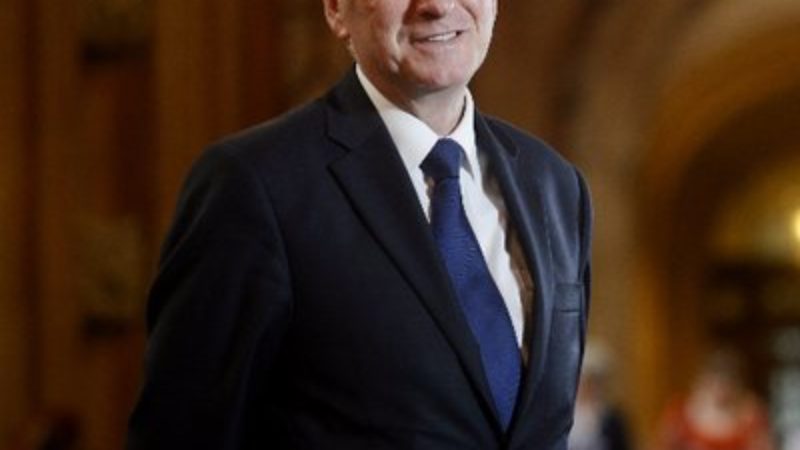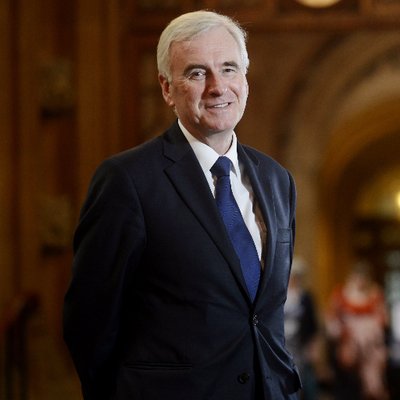

We’ve all learned one thing from chancellor Philip Hammond’s speech.
He’s worried, absolutely terrified, of a Labour government. Why else would he spend most of a 40 minute speech trying to convince his rather thin audience how awful it would be?
But it must surely be a first for any chancellor of the exchequer to use their first conference speech after a general election to so studiously avoid talking about their own economic policies or record in office.
I can’t really fault him for trying. If I was Philip Hammond, I’d want to avoid talking about my party’s economic record in office, too.
Despite the worst spending cuts for three generations, a budget deficit that was supposed to be cleared by 2015 is now forecast to stretch into 2025 – and perhaps beyond.
After inflation, wages today are lower than they were in 2010, and falling. Growth is slower, and faltering.
There is a crisis in housing. A crisis in the NHS. A crisis in our social care system.
So it’s little wonder that Philip Hammond didn’t want to draw too much attention to any of this.
Yet even when he did, he tried to blame Labour. The chancellor claimed business investment is weakening not because of Tories’ economic failures– but because “even in opposition” Jeremy Corbyn was somehow deterring investors.
We’ve had seven years of Tories blaming their failings on the last Labour government, but it’s more than a bit surreal to see them now trying to blame the next Labour government.
It’s less funny, however, when a government refuses to accept responsibility for the misery and harm it is already causing, whether to our young people forced into overpriced, substandard housing, the parcels handed out by foodbanks (“rather uplifting” according to current Tory darling Jacob Rees-Mogg), or hardworking public sector workers who’ve seen their pay fall for almost a decade.
Yet the only apology the chancellor saw fit to offer was to the Tories’ big business backers, for the appalling state of the Conservatives’ election campaign. Politics is the language of priorities, I suppose.
The chancellor may, at times, have displayed some understanding as to why the Tories are losing the argument.
He realises that with Labour’s clear economic message and the enthusiasm and excitement around the party that was so clearly on display in Brighton, he has a real political fight on his hands.
Not just over policy – but over the whole direction of our economy, which shovels wealth into the hands of the few at the expense of the many. As Jeremy said in his own conference speech, our economic model is broken. We need a new direction.
We need investment across the whole country, on the scale needed to transform this economy. We need our public services placed on a secure footing by making sure the wealthy and the corporations pay their fair share. And we need a £10 an hour real living wage to lift people out of poverty pay.
The chancellor’s speech was meant to be a defence of the free market. But it was striking that in a 40 minute speech he spoke about the 1970s – at length, and about Cuba, Zimbabwe, and Venezuela.
Anywhere, and any time, apart from Britain, today, under the Conservatives.
Instead we had a lengthy and smear-ridden rant about the supposed iniquities of Jeremy Corbyn’s Labour and a complete failure to appreciate people’s anger at the rigged market the Tories have created.
If you listened closely, you could sometimes hear the squeak of a policy announcement or two.
Some funding for railways in the north and midlands – this, after electrification schemes were cancelled across the country over the summer.
More money for Help-to-Buy – but no money to actually build houses. For a devotee of the free market, the chancellor seems remarkably blasé about stoking up demand for housing, whilst doing nothing about the supply. And, naturally from the chancellor who added more than his predecessors to the national debt during his first year in office, it’s going to be borrowed.
This was a Tory chancellor’s speech that matched its conference. Empty, directionless, consumed by bilious nostalgia and petty arguments.
It’s only Labour that now has the clear plan to meet the challenges ahead and build an economy that works for the many, not the few.
John McDonnell is shadow chancellor.




More from LabourList
‘Labour promised to make work pay. Now it must deliver for young people’
‘Council Tax shouldn’t punish those who have the least or those we owe the most’
Two-thirds of Labour members say government has made too many policy U-turns, poll reveals